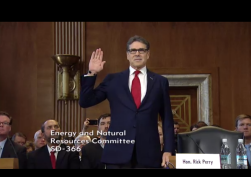
The proposed U.S. Secretary of Energy, Rick Perry, once said that he would like to see the Department of Energy eliminated. However, now that he has been tapped to lead the department and understands its role Perry said he “would be honored” to be confirmed as the next leader of the U.S. Department of Energy (DOE).
“My past statements made over five years ago about abolishing the Department of Energy do not reflect my current thinking. In fact, after being briefed on so many of the vital functions of the Department of Energy, I regret recommending its elimination,” he said in his opening statement at his confirmation hearing on Thursday.
On the issue of climate change, Perry said he makes decisions based on sound science, especially when people’s lives are at stake but admitted to Senator Bernie Sanders that he doesn’t view climate change as a crisis nor does he believe that the U.S. should take the lead in transforming its energy supply away from fossil fuels.
To highlight his ability to make decisions based on science Perry pointed to a time when he was governor of Texas and scientists told him that a hurricane was coming and that one million people could die as a result of it.
“Those are sobering moments in an individual’s life,” he said, adding that he immediately began efforts to evacuate the people who would be impacted by the storm.
But the hurricane didn’t hit and people did not lose their lives, which means that Texas taxpayers must have spent a fair amount of money protecting citizens from something that never occurred.
“That data happened to be unfortunately wrong for that particular storm,” he said, “but the point is I made a decision based on the most sound science I could find.”
“Maybe They Will Forget They Said That”
At the heart of his testimony was Perry’s belief in technology. He has great hope that the U.S. can solve energy issues through research and development. He pointed to the national labs (Sandia National Lab, National Renewable Energy Lab, Idaho National Lab, Argonne National Lab and others) and universities as great places for public-private partnerships in research.
He was also clear that research should be conducted on all forms of energy and that he supports an "all of the above" energy policy.
“I feel positive that some scientist, some incredibly capable man or woman either at the DOE or at one of our universities or laboratories has technology to be able to use coal in a way that is friendly,” he said.
Perry was asked repeatedly during the hearing to comment on recent reports that the Trump administration will drastically cut the DOE’s budget, eliminating the Office of Energy Efficiency and Renewable Energy (EERE), Office of Electricity and Office of Fossil Fuels. He said he would fight to keep them going.
“I will be in the room advocating for these types of things,” he said.
“I’m not going to tell you I’m going to be 1000 percent successful but I can assure you — and people who know me and who have worked with me know — of my commitment to making sound science, economic science connected together because at the end of the day they make great economic sense and great quality of life.”
Senator Hirono of Hawaii also asked about the Trump transition team's announcement that it would gut the DOE.
"It's hard to see how we can pursue an ‘all of the above’ strategy if so much of the department’s ‘all of the above’ capabilities are eliminated," she said. Adding, "My question is, do you support these cuts?"
"Well, Senator, maybe they'll have the same experience I had and forget that they had said that," said Perry.
Federal Funding for Research but Not Business
Clean energy companies enjoyed a large amount of support in the form of grants and loan guarantees under Obama. According to a Whitehouse.gov fact sheet, President Obama made the largest single investment in clean energy in history under the American Recovery and Reinvestment act. Through it, he provided more than $90 billion in strategic clean energy investments and tax incentives to promote job creation and the deployment of low-carbon technologies. That level of federal support for clean energy will most likely end.
Perry made it clear that he believes the states should set their own energy goals and set aside their own funds to support them.
Hirono, who’s state has the most aggressive renewable energy goal in the nation at 100 percent renewables by 2045, asked if he would support a national renewable energy standard to which he said no.
“If you are going to leave it up to the states, will you at least continue to support states efforts in these areas,” she asked.
“Absolutely, said Perry.
“I will talk to any governor about the wisdom of using their universities, using the private sector, using the Department of Energy where it fits to come up with the technologies that moves forward their states positions from the standpoint of renewables....and I'll be happy to give them a roadmap on how to do that.”